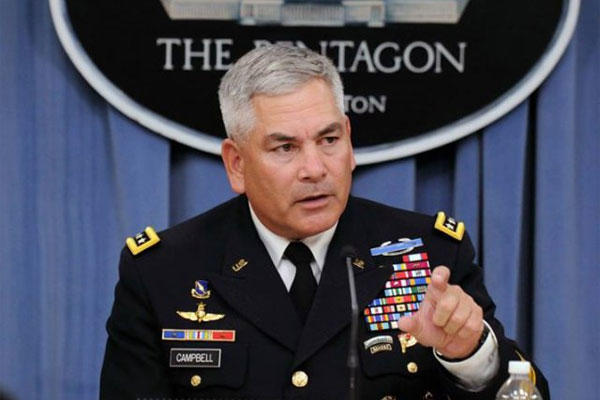The U.S. commander in Afghanistan said Tuesday that the death of Mullah Omar could fracture the Taliban and demoralize its fighters, offering an opportunity for renewed peace talks.
Army Gen. John Campbell, who took command in Afghanistan last August, also said that he would make a recommendation in the fall on whether to keep U.S. troops in Afghanistan past 2016 while noting that several NATO partners have indicated a willingness to stay.
Last week, Campbell met with Afghan President Ashraf Ghani a day before reports surfaced that Omar had died in a Pakistani hospital. Preliminary peace talks with Taliban representatives were immediately suspended.
However, Campbell said Tuesday at a Brooking Institute forum in Washington that he now saw Omar's death as an "opportunity" to convince Taliban fighters to put down their weapons and resume talks.
Omar had achieved mythic status with the Taliban fighters, Campbell said. "All they had to have was this notion that they had a spiritual leader, a commander, that was out there that kept them moving," he said.
"And now knowing that he's been dead, knowing he's been dead for several years since about April 2013, that's going to cause people to think -- the Taliban fighters -- what have I been doing this for?"
"I think there's an opportunity there" for both the Afghans and the Pakistanis "to help move forward and facilitate bringing the Taliban to the table," Campbell said while acknowledging that "there's been years and years of mistrust" between the Afghans and the Pakistanis.
Based on his own discussions with Pakistan's military leaders, Campbell said that "I think there's going to be a concerted drive by Pakistan to drive the Taliban to the peace table."
In a sign of internal disputes over the succession to Omar, a senior Taliban figure resigned Tuesday in a growing rift over leadership of the movement.
Mohammad Tayab Agha, head of the Taliban's political office, said in a statement that the movement had made a "historic mistake" by concealing Mullah Omar's death for more than two years and by choosing his successor at a meeting in Pakistan rather than in Afghanistan, the Associated Press reported from Kabul.
In addition to the succession dispute, the Taliban has also had to deal in recent months with defections to the small but growing band of ISIS followers in Afghanistan.
On the U.S. and NATO presence in Afghanistan, Campbell said that NATO partners "have come on strong and said, hey, what role could we play" when the current Operation Resolute Support is scheduled to end by Dec. 31, 2016.
Currently, there are about 9,800 U.S. and 3,500 NATO troops in Afghanistan. President Obama's plan is to reduce the U.S. commitment to what would essentially be an embassy presence by the end of 2016.
"I think, quite frankly, NATO is waiting to see what the U.S. is going to do" on troop levels, Campbell said. He said he would be making a recommendation on troop strength in the fall and "I think based on that we'll make some decisions."
Campbell said he continued to be impressed by the performance of the Afghan National Security Forces (ANSF) during the current fighting season despite an attrition rate of about 4,000 soldiers and police per month.
Campbell said the high attrition rate in the ANSF was mostly due to desertions. "When you're fighting all the time, when you need to take a break and you have no other way, you go back home and you don't come back," Campbell said.
-- Richard Sisk can be reached at Richard.Sisk@military.com





























